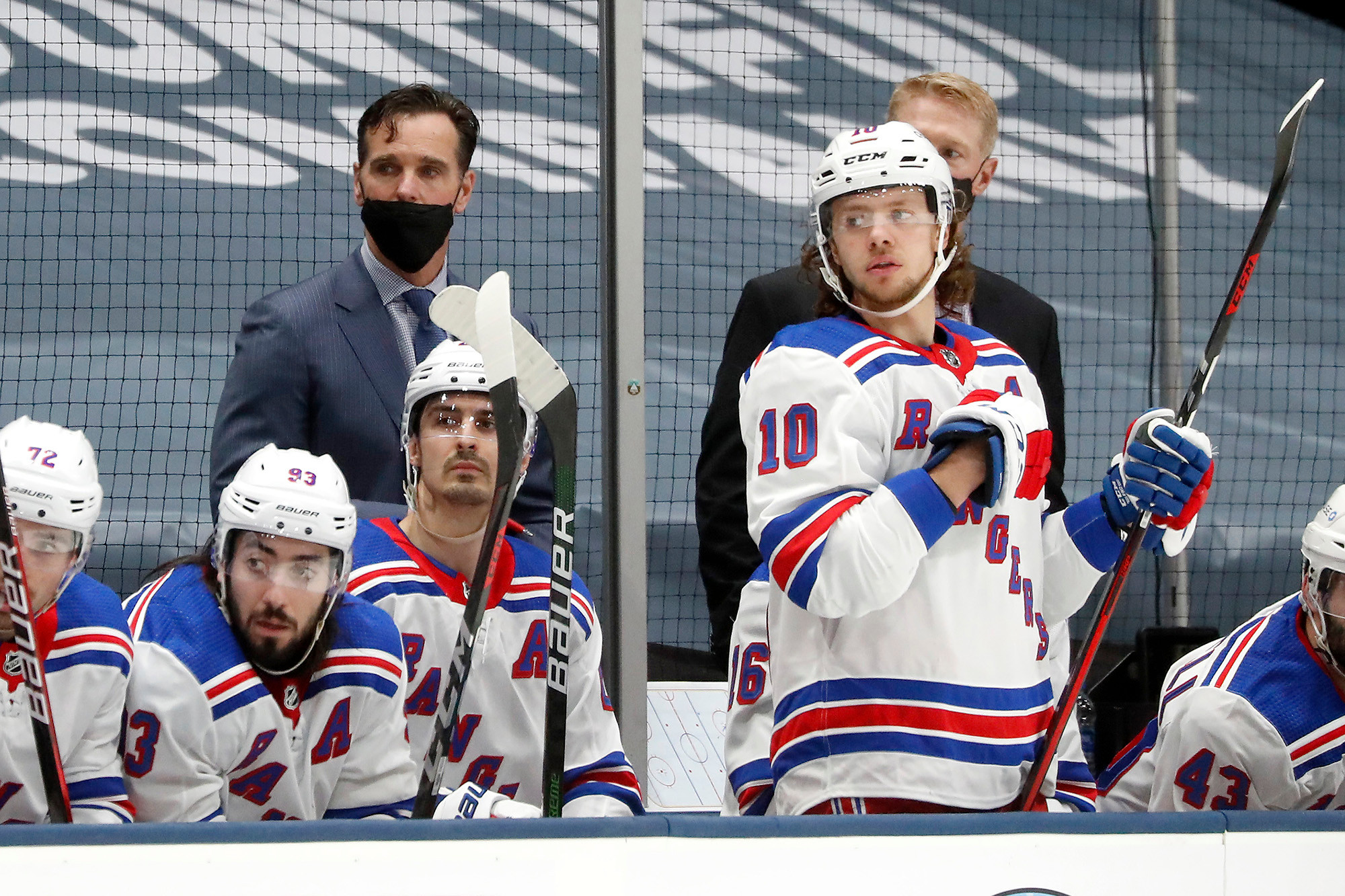More On: artemi panarin
Gerard Gallant is ideal choice to solve star issue that haunted Rangers
Craziest Rangers season ever isn’t what you think
Rangers crush NHL’s George Parros as ‘unfit’ for role after Tom Wilson verdict
NHL must ban Tom Wilson for nearly killing Artemi Panarin
Rangers must resolve disconnect between David Quinn and top forwards
There is an issue at the top of the Rangers lineup that must be resolved before the hierarchy can move into what necessarily must be a Summer of Reconstruction to transform this collection of...
More from:
Larry Brooks

Final Coliseum clash deserved better than inevitable Rangers loss
Boston Bruins' snub of all-time great is ridiculous
Rangers shakeup coming after season-crushing no-show
This Rangers-Islanders game is as high-stakes as it gets
Rangers facing massive decision with Islanders suddenly within striking distance
There is an issue at the top of the Rangers lineup that must be resolved before the hierarchy can move into what necessarily must be a Summer of Reconstruction to transform this collection of homogenous ingredients into a more diverse blend that can take the next step in its evolution.
And that is resolving what surely seems a disconnect between the team’s marquee forwards and head coach David Quinn. I am not suggesting that there has been a rebellion that has undermined the season. I am not saying this is tantamount to the Mark Messier-Roger Neilson schism of 1992-93 that resulted in the coach’s dismissal that ultimately cleared the way for the hiring of Mike Keenan, but it has been clear for months that the high-end players and Quinn do not see the game the same way.
But more consequential than that, it has also been clear that the high-end players have had little if any interest in changing their approach in order to accommodate the coach. It is their way, their increasingly obstinate way, in which there has been no quarter given by either side.
As frustrating as it must be for Quinn to watch the top two lines continue with a high-risk, high-reward approach that has provided diminishing returns this season despite constantly being counseled against it, it must be equally infuriating for, say, Artemi Panarin, Mika Zibanejad, Ryan Strome and Pavel Buchnevich to hear the coach publicly complain about it after nearly every game, including victories.
There have been points this year when Strome, who at times goes into a stream of consciousness doing Zoom interviews and should be applauded for adding candor to the mix, has talked about how the talented players’ shoot-last mentality should not be second guessed.
Meanwhile, the coach has repeatedly referred to the lack of a shooting mentality as a problem, often using the “east-west” shortcut as code in his Zoom conferences. After one game early last month Quinn said that not shooting the puck “has been a problem since I’ve been here.”
But it is the coach’s job to rectify problems, isn’t it?
The Rangers have been east-west since the moment Alain Vigneault removed the metaphorical shackles that had been affixed to the clubs’ high-end skaters by John Tortorella. So, for eight years. For most of their existence, the Blueshirts have been pretty. The time of the Black-and-Blueshirts was an aberration. Pretty is in the bloodline.
Here’s the thing, though. The Rangers were a lot of east-west last year, but it was not like this. The post-game taffy-pull did not exist, at least not like this. And the skill guys — and, honestly, we’re talking for the most part about Panarin, Zibanejad and Strome — weren’t like this against the top teams. They were not like this against the Islanders.
In fact, perhaps the team’s two most noteworthy games last season came at the Coliseum, thrilling 3-2 and 4-3 victories within five weeks over the Islanders, the first won in the final half-minute of regulation by a Kreider power-play goal and the second won in overtime on Zibanejad’s dart off an impossible feed from Panarin, who was surrounded by three opponents.
Here’s what I don’t get: Panarin, Zibanejad and Strome all had career seasons last year while playing for Quinn. So they certainly weren’t stifled. Something has changed. Maybe last season’s experience under the bubble in which the top players were stifled by Carolina changed the dynamic. Maybe Quinn became more insistent, maybe he became less patient with them. Maybe there is simply too much literal looking over the players’ shoulders.

I cannot say for sure, but I am also not certain that it can be simply marked as a coincidence that Zibanejad’s twin six-point explosions against the Flyers eight days apart in March came while Quinn was away from the team on the COVID-protocol list while a more restrained Kris Knoblauch was behind the bench as acting coach.
The Rangers have cut down their goals-against by a full half-goal per game over the last season, their GAA dropping from 3.14 to 2.63, their rank in the league improving from 23rd to ninth. This does not represent a fun-house mirror reflection of their work warped by extraordinary goaltending, either. For per naturalstattrick.com, the club’s xGA per 60:00 has gone from a league-worst 3.23 to 15th-best 2.5.
These numbers indicate tangible progress both on the blue line and in the club’s approach away from the puck. While there is no doubt that Jacques Martin’s work as lead defensive assistant has been critical, this also falls under the aegis of the head coach who has overseen — all together now — the youngest team in the league! The young forwards are infinitely more responsible two-way players.
But the team needs to be reimagined. Grit does not have to altogether replace glitter, but will need to reinforce it. Before that, though, issues must be addressed and resolved.
It is critical that Quinn’s relationship with his marquee forwards be at the top of the list.
This story originally appeared on: NyPost - Author:Larry Brooks

















